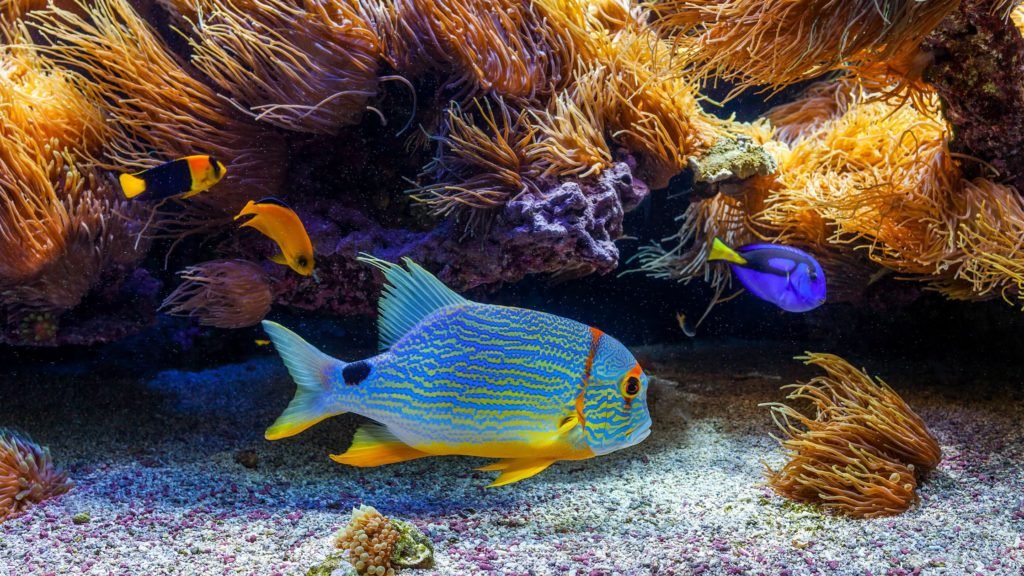Exotic Fish to Have as Pets can turn an ordinary room into an extraordinary underwater spectacle. Let’s explore the options.
The world beneath the water’s surface is magical, teeming with vibrant colors and exotic fish species. Have you ever wondered about introducing some of this aquatic wonder into your own home? The notion of having exotic fish as pets might seem daunting at first. However, these creatures’ beauty and charm could make it a rewarding experience. This comprehensive piece highlights the intriguing world of exotic fish, how to care for them, and why they might be the perfect pets for you.
Understanding What Makes a Fish 'Exotic
Before diving into the details of keeping exotic fish as pets, understand what we mean by ‘exotic.’ Generally, an exotic fish species isn’t native to the place where it’s being kept. These species often display unique colors, shapes, and behaviors that differentiate them from more common varieties. But how does one choose the right exotic fish, and what should you know before bringing one into your home? Let’s explore.
Popular Exotic Fish Species for Your Aquarium
An array of exotic fish species can thrive in a home aquarium. Each offers a distinct personality and aesthetic, from the vibrant Betta fish to the unique Angelfish. This section guides you through some of the most popular choices for exotic fish pets.
Essential Requirements for Keeping Exotic Fish
It’s more complex than just filling a tank with water when keeping exotic fish as pets. Numerous factors must be considered to ensure these aquatic creatures thrive in their new environment.
Suitable Tank Size and Environment
The first step in your journey to owning exotic fish is providing them with a suitable home. The tank size will depend on the species of fish you choose – some require more space than others. Additionally, fish have different needs regarding tank decorations, plants, and hiding spots.
Water Conditions
Exotic fish often have specific water condition requirements, including temperature, pH, and hardness. Regular testing and adjustment are critical to keep these parameters in check.
Compatibility with Other Fish
Not all fish play nice. Some species are more aggressive or have different environmental needs, making them incompatible with certain other fish. Researching and considering compatibility before introducing a new pet into your aquarium is essential.
Dietary Needs of Exotic Fish
Just as exotic fish are more diverse and colorful than their typical counterparts, so too are their diets. Knowing what to feed your fish is crucial for their health and happiness. Some are carnivorous, others are herbivores, and many fall in between. It’s essential to provide a diet that fits their natural eating habits.
Regular Feeding Schedule
A consistent feeding schedule is vital for the health of your exotic fish. Overfeeding can cause many health issues, including obesity and water pollution. As a general rule, feed your fish only what they can consume in a few minutes and remove any uneaten food promptly.
Special Nutritional Requirements
Certain exotic fish species may require additional nutritional supplements to maintain their health. These can include vitamins, minerals, or specific types of food. Research your chosen fish species to ensure you meet all their dietary needs.
Choosing the Right Exotic Fish for Your Aquarium
With hundreds of exotic fish species, deciding which ones are right for you can be overwhelming. However, you can make an informed decision by considering factors such as your experience level, the size of your aquarium, and the specific care requirements of each species.
Beginner-Friendly Exotic Fish
For those new to the world of exotic fish keeping, some species are particularly well-suited for beginners. These fish are hardy, adaptable, and require relatively simple care. I’ll list some beginner-friendly exotic fish in the next part of this article.
Exotic Fish for Advanced Aquarists
Plenty of exotic species require more dedication if you’re an experienced fish keeper looking to challenge yourself. These fish often have specific environmental needs and dietary preferences that can be difficult but rewarding to accommodate.
Beginner-Friendly Exotic Fish
Guppies (Poecilia reticulata)
One of the most colorful and active options for beginners, guppies are small, hardy, and reproduce rapidly. Their colors and tail shape variety can give your tank an exotic feel.
Zebra Danios (Danio rerio)
Zebra Danios are hardy fish that are perfect for beginners. They are active swimmers and have striking horizontal stripes, making them a visually appealing addition to your aquarium.
Swordtails (Xiphophorus hellerii)
Named for the distinctive, sword-like extension on their tails, Swordtails are hardy and adaptable. They come in various colors, providing an exotic look to your tank.
Creating the Ideal Environment for Your Exotic Fish
To keep exotic fish as pets, you must create an environment that matches their natural habitat as closely as possible. This will ensure they stay healthy and display their best colors and behavior.
The Right Aquarium Setup
Depending on the type of fish you choose, you’ll need to select an appropriate aquarium size, substrate, and decoration. For example, Discus fish prefer tall aquariums, while Zebra Danios require plenty of horizontal swimming space.
Water Parameters
The water’s pH, hardness, temperature, and cleanliness are crucial for the well-being of your fish. Some fish are adaptable, but others, like the Discus and African Cichlids, have strict requirements.
Feeding Your Exotic Fish
Each species has unique dietary needs. Some are omnivorous; others are strictly carnivorous or herbivorous. Researching and providing the correct diet for your pet fish is essential.
Breeding Exotic Fish at Home
Understanding the Basics
Before you dive into the world of breeding exotic fish, it’s essential to understand the basics of fish reproduction. Each fish species has unique mating rituals, gestation periods, and breeding requirements.
Choosing the Right Species
Not all fish species breed well in captivity. Do thorough research to identify a species that fits your level of expertise and your aquarium environment.
Setting Up the Environment
Once you’ve chosen your species, set up a suitable breeding environment. That often involves adjusting the aquarium’s temperature, pH, and lighting to mimic the fish’s natural habitat during the breeding season.
Pairing the Fish
Depending on the species, you may need to introduce male and female fish to each other in a specific way. Some fish prefer to choose their mates, while others can be paired off without much fuss.
Monitoring the Breeding Process
Keep a close eye on your fish during the breeding process. Watch for signs of courtship and mating, and ensure that the fish are not showing signs of stress or illness.
Caring for the Eggs or Fry
After the fish have mated, your attention should turn to the eggs or baby fish (fry). Depending on the species, you may need to separate the eggs or fry from the adult fish to ensure their safety.
Feeding the Fry
Baby fish require a special diet to support their rapid growth. Newly hatched brine shrimp, infusoria, or specialized fry food are common choices.
Monitoring Growth and Health
As the fry grows, monitor their health and development closely. Keep the tank clean and maintain optimal water conditions.
Transitioning to Adult Food and Environment
Once the fry has grown, it can gradually transition to adult fish food. Depending on the species, they may also need to be moved to a larger tank or a tank with different environmental conditions.
Learning from the Experience
Breeding exotic fish is a learning process. Whether your first attempt is a success or failure, take notes on what worked and what didn’t, and use this knowledge to improve your future breeding efforts.
Frequently Asked Questions about Exotic Fish
How much does it cost to keep exotic fish?
The cost of keeping exotic fish as pets can vary greatly. It depends on the type of fish, the size of the tank, the equipment needed, and the care requirements of the fish. In general, expect to invest in a quality tank, filter system, heater, lighting, decorations, food, and medication.
Can all exotic fish live together?
No, not all exotic fish can live together. Different species have different needs and temperaments. Some fish are peaceful and can live in a community tank, while others are aggressive or territorial. Always research the compatibility of fish species before adding them to your tank.
How long do exotic fish live?
The lifespan of exotic fish varies greatly depending on the species. Some species, like certain guppies, may only live for a few years. Others, like the goldfish or Discus, can live for a decade or more with proper care.
Do exotic fish need a lot of care?
Exotic fish do require a significant amount of care compared to more common pet fish. They often need a specific diet, water conditions, and tank setup. However, caring for exotic fish can be a rewarding experience with the proper knowledge and commitment.
How often should I clean the tank?
The frequency of tank cleaning depends on several factors, including the size of the tank, the number and species of fish, and the effectiveness of your filter. Performing a partial water change of 20-30% every 1-2 weeks is recommended for optimal aquarium health.
Conclusion
Keeping exotic fish as pets can be a rewarding hobby that offers a unique combination of science and art in your home. It requires commitment and learning, but the beauty and tranquility that a well-maintained exotic fish tank can bring are well worth the effort. Remember, every successful fish keeper started as a beginner, so don’t be discouraged. With time, patience, and some trial and error, you’ll be a pro in no time!
Stay tuned to our blog for more helpful tips on making your exotic fish feel right at home!
Related Articles

Mastering the Art of Dog Training: How to Train Your Dog to Stop Barking
Introduction to Dog Barking Barking is an inherent characteristic of dogs, serving as a primary

How to Clean Goldendoodle Ears: Preventing Infections
Welcome to our essential guide on how to clean Goldendoodle ears. As every doodle owner

Top Picks: Best Harness for Goldendoodle Revealed!
Welcome to our comprehensive guide on finding the best harness for your Goldendoodle! After scouring

